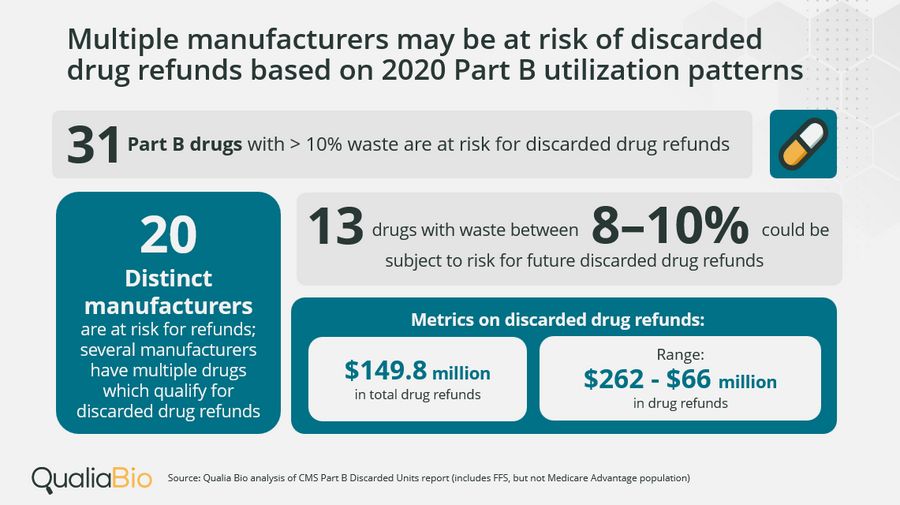Medicare Part B Discarded Drug Refund Legislation
In today’s post, we will review new legislation which gives CMS the authority to require refunds from manufacturers of Medicare Part B drugs which exceed a predefined wastage threshold. CMS estimates a potential $3 billion in savings over 10 years as a result of the new policy.
Overview
Beginning in 2017, CMS required that physicians, hospitals, and other providers submitting Medicare Part B separately payable drug claims to report any discarded amount of a single-use vial or other single-use package drug on its claim for reimbursement. Providers must use the “JW” modifier, a HCPCS Level II modifier, to separately identify the exact discarded amount on the claim. As Medicare policy has been to pay for administered and discarded amounts of a Part B drug up to the amount that is indicated on the vial or package label for single-use vials, the wastage associated with some single-use vials represents an inefficient use of Part B funds.
The new law allows CMS to require refunds on discarded use amounts from manufacturers of Part B drugs packaged in single-use vials which exceed a defined wastage threshold.
What are the key aspects of the new law?
Manufacturers of Part B drugs which have a discarded unit rate of >10% are subject to a rebate amount based on the discarded unit utilization above 10%. For example, a Part B drug with a discarded unit rate of 30% could be liable for a 20% (30% discard rate – 10% wastage threshold = 20%) refund on the discarded units documented in claims by the JW modifier.
CMS can change the wastage threshold for select Part B drugs through rulemaking. One instance of this is for drugs reconstituted with hydrogel and administered by ureteral catheter or nephrostomy, the wastage threshold is increased to 35%. Other exceptions include radiopharmaceuticals and imaging agents which are excluded from the new law.
Sites of care impacted by the JW modifier code primarily include physician office and hospital outpatient settings; Critical Access Hospitals are also impacted as drugs are separately payable in this setting. The JW modifier code does not apply to drugs administered in Rural Health Clinics or Federally Qualified Health Centers. The modifier is not intended for use on claims for hospital inpatient admissions which are billed under the Inpatient Prospective Payment System.
Tracking of wastage for potential rebates will begin in January 2023 and CMS will generate a report to be delivered to manufacturers of the affected products. At this time, no specific date for report delivery has been communicated other than manufacturers should expect a report no later than the end of 2023.
How is the law expected to impact Part B drug manufacturers?
To get a sense as to the potential impact of the new policy on manufacturers, Qualia Bio conducted an analysis of a CMS Part B Discarded Units Report. The data used in this report reflect 2020 utilization and includes Medicare fee-for-service lives only; Medicare Advantage utilization was not included as part of the CMS report. An overview of the key findings from the analysis are seen in Figure 1 below:
Figure 1

Based on 2020 utilization patterns, the discarded drug rebate law appears to impact a relatively small subset of Part B drug brands. However, the discarded drug rebates can be significant in some cases and suggests manufacturers should consider mitigation strategies to limit potential financial risks related to the new program.
Implications for Part B Manufacturers
For Part B manufacturers, the first step will be to assess if any of their marketed brands are close to or exceed the wastage threshold established by CMS. For drugs at risk of discarded drug rebates, manufacturers may wish to consider whether updated educational outreach to providers on coding and billing may be sufficient to limit drug wastage. In cases where educational outreach would have limited impact and the brand refund rebate risk is high, manufacturers may evaluate new packaging which serves to offset discarded drug utilization.
Qualia Bio’s expertise and analytical resources can help manufacturers assess and respond to market events such as the discarded drug rebate rule. Contact us with questions or inquiries on this or other Medicare or Medicaid business questions that your organization may have. We can be reached at [email protected].